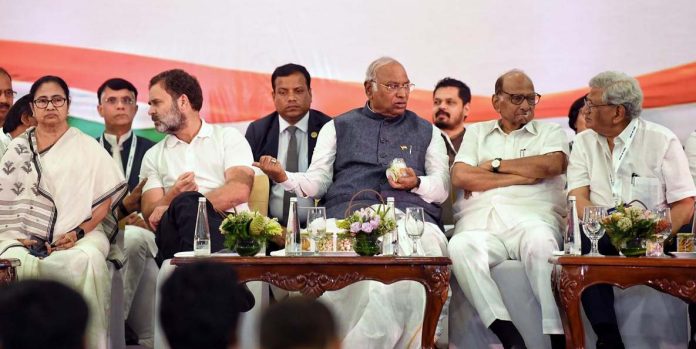Brij Bhardwaj
The opposition parties alliance INDIA held another meeting in Delhi to work out strategy for the Lok Sabha polls in 2024. The impression is that they are just too late to effectively challenge the BJP. They are yet to decide who their Prime Ministerial candidate is, and have also not decided on a common minimum programme to be implemented by them in case they are voted to power.
The manner in which the ruling party rejected their demand that Home Minister Amit Shah or Prime Minister Narendra Modi make a statement in the Parliament on the recent security breach when two intruders entered the Lok Sabha hall and exploded smoke bombs was rejected is acting as a glue to keep opposition parties together. The differences between them on issues of seat-sharing and leadership are not allowing them to unite to give a fight despite suspension of opposition members from both houses for unruly behaviour.
The proposal by West Bengal Chief Minister Mamata Banerjee that Congress President Malikarjun Kharge be made the face of the INDI alliance of opposition parties as Prime Minister, which was supported by Delhi Chief Minister Arvind Kejriwal, was described by critics as a googly sent by them to keep Rahul Gandhi, who many want to project himself as a candidate for the post of Prime Minister, out. This proposal also upset the Bihar group led by Lalu Prasad and the Chief Minister of Bihar, Nitish Kumar. Mr Kharge also declared that he was not interested in any post and suggested that the alliance should first work to secure a Lok Sabha majority, after which the members of the Lok Sabha can elect a Prime Minister.
There were also differences on the issue of agreement between opposition parties to give a one to one fight to the BJP on the majority of seats in the Lok Sabha. Mamta Banerjee declared that Congress has not responded to her proposal for an alliance in West Bengal. Congress on other hand is a part of a joint front with the Communist party, a member of INDI alliance, but with whom Banerjee is not ready to form an understanding.
There are also problems between Congress and the Aam Aadmi Party in seat adjustment in Punjab and Delhi. The only states where there are no problems are Maharashtra, Bihar, and Tamil Nadu, where a broad understanding exists between different parties of the alliance. The biggest problem is in Hindi heartland states like Rajasthan, Madhya Pradesh, and Chattisgarh, where there is a direct fight between Congress and the BJP. No other party in the group has any meaningful presence in these States.
Political observers have pointed out that in direct fights between BJP and Congress, the ruling party wins by a huge margin in most of the seats and unless the performance of Congress party improves in these states, the India group has no chance of winning. The BJP’s strength is that even in States where it has a small presence in state assemblies, it wins seats in the contest for the Lok Sabha because of the popularity of Prime Minister Narendra Modi.
Another state where BJP scores well is UP, which sends eighty members to the Lok Sabha. In UP, the Samajwadi Party is a major opposition party and has won many seats in the State Assembly, but performed poorly in the poll for the Lok Sabha. Congress party has marginal presence in UP, and even the combined strength of Samajwadi party and Congress will not be able to do much in UP as the third party in UP is the Bahujan Samaj Party, which is not prepared to join hands with the INDIA group. As such, it is clear that the INDI alliance, which many regional parties and Congress have joined, can at best emerge as an opposition group, and will likely be unable in preventing the BJP from being voted to power.
The alliance has declared that they will finalise seat adjustment to give a one to one fight to the BJP in the majority of seats by December 31st. This is more easily said than done. They have also promised to come out with a common minimum program. Even if the deadline is kept, it will be late, and there is still a big ‘if’ in this declaration. A critic described the INDI alliance as ignoring the harsh reality of ‘to be or not to be’. They share their opposition to the BJP and Prime Minister Narendra Modi, but find it difficult to overcome the differences between them.
Trending Now
E-Paper


